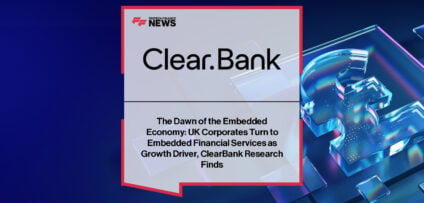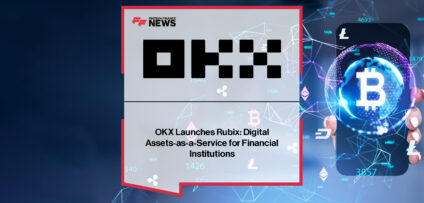Breaking News

EXCLUSIVE: “When Worlds Collide” – Wayne Lloyd, Smarter Contracts in ‘The Fintech Magazine’
Wayne Lloyd, Founder & CEO of Smarter Contracts, the fintech behind consent management platform Pulse, says the multiverse of trust is heading for its own big bang
Back in 1956, physicist Hugh Everett’s ‘many worlds’ theory described how the entire universe exists in multiple states – something he termed the ‘multiverse’. Since then, physicists have proposed many types of multiverses, including parallel worlds.While these co-exist, physics dictates that ‘no communication occurs between them, so no universe is aware of the presence of any other’. It does, however, support the notion that they can collide! The principle behind the theory appropriately describes how I view the last 13 years of digital change and innovation across financial services – specifically two parallel worlds that have grown under two very different realities: the fintech and crypto worlds. The ‘big bang’ that accelerated the growth of both these worlds occurred in 2008.
Known as ‘The Global Financial Crisis’, its impact spread across all parts of the financial services industry to devastating effect. It caused deep financial losses, mass unemployment and led to the collapse of significant financial institutions, which resulted in the loss of customer trust in the banking system. This event, combined with the fact that banking had not seen real change for centuries and that the wider world was becoming increasingly mobile and digitally savvy, created the perfect storm for change.Fintech describes technologically enabled financial innovation that gives rise to new business models, applications, processes and products that have the potential to change financial markets and institutions.
“The crypto world has evolved in such a way that it is impossible for the fintech world to ignore it any longer. And so we will begin to witness their inevitable collision”
So, you might think the term fintech also describes crypto. One only needs to read crypto community forums to appreciate the disdain with which such an association is viewed, some arguing that fintech is merely iterating on the incumbent rails of traditional finance, while crypto is building something brand new and fundamentally transformational.Such opinions underline why it’s important that both worlds should always remember their ‘why’. Most companies know what they do and how they do it, very few companies are able to clearly articulate the reasons why they do what they do. By reminding ourselves that the growth of the fintech and crypto worlds were both accelerated from the ashes of the financial crisis, it is fair to conclude that the ‘why’ of both worlds is to restore society’s trust in a broken financial system.Indeed, shortly after the Bitcoin genesis block was mined, its creator, Satoshi Nakamoto, confirmed trust as being the crypto world’s ‘why’. Nakamoto wrote:
“The root problem with conventional currency is all the trust that’s required to make it work. The central bank must be trusted not to debase the currency, but the history of fiat currencies is full of breaches of that trust.”
Trust here refers to an individual’s reliance on another person or entity under conditions of dependence and risk to take control of one’s assets. It’s how each world has approached the building of trust that really defines how remarkable both are, if you’re gazing from one world to the other. The fintech world has built trust by adopting a laser focus on disrupting lower-margin business or niche business operations that incumbent banks had previously overlooked. Fintechs have been able to provide individuals with access to lower cost services via well-designed platforms or mobile applications that are easier to access and use. While trust is one of the central goals of UX design, instilling trust goes beyond this. So, the fintech world also introduced 24/7 customer services via non-traditional channels, such as social media. This empowered customers to expose any failures of those services in real-time and to a wider audience. So, fintechs have been compelled to deal with complaints as quickly as possible, while also demonstrating that they have learned from those failures accordingly.
Beyond societal trust, the fintech world has also been effective in winning institutional trust. This has accelerated from the passing of legislation such as open banking and the revised Payment Services Directive (PSD2), which provided fintechs with unprecedented access to the banks’ customers and their banking data. This has allowed fintechs to build personalised products and services that benefit customers in ways that traditional financial service providers had previously been unable to offer. Personalisation is seen by some academics as a key ingredient of trust because it fulfils the customer need while also creating a feeling of being in control. Institutional trust has also allowed fintechs to access an abundance of venture capital (VC) funding. In 2021 alone, more than $210billion was invested into the fintech world, which was a 10-fold increase on that invested in 2016. That’s allowed fintechs to acquire the best talent and disruptive minds, which deepens the trust of institutions and investors alike. And consumer adoption of fintech companies and products has grown exponentially as a result, with more than 75 per cent of consumers globally adopting some form of money transfer and or payment service by 2019, according to Statista.
The evolution of the crypto world is diametrically opposite to this.
Given the absence of societal and institutional trust, the crypto world’s evolution has been remarkable in that it has been able to build trust through technology. The building blocks of this were created following the release of the Bitcoin whitepaper, which introduced a peer-to-peer electronic cash system, operating without the need for any central authority or bank, using blockchain. Since its launch, Bitcoin has grown to become a significant store of value with some (myself included) arguing that Bitcoin enhances the properties of gold, making it the ultimate store of value.Since Bitcoin was launched, the crypto world has introduced thousands of digital assets, each one designed to solve a specific problem within the financial sector and beyond. Like the fintech world, these crypto projects have focussed on reducing the costs and friction that traditional banking had ignored. Well-publicised use cases that the crypto world has improved upon include cross-border payments, trading, fundraising and clearance and settlements.
Indeed, in 2017, Pictet Asset Management believed that by 2022 the underlying technology of the crypto world ‘could reduce global banks infrastructural costs by $15billion to $20billion a year’.The success of the crypto world is even more impressive when we consider the lack of attention that has been paid to the UX. Early users of crypto will remember the interfaces of products like My Ether Wallet, exchanges such as MT. Gox, and, more recently, lost exchanges such as Cryptopia. The UX designs were terrible, and the personalisation was non-existent.Furthermore, due to the decentralised nature of the technology, the concept of customer services does not exist.
When things go wrong, there is no recourse for crypto users to take, apart from writing an angry Tweet. Trusting the technology is literally the only choice that the users have.Despite the innovations that the crypto world has unlocked, it has evolved under a constant cloud of uncertainty due to the opposition from banks, regulators, and society alike. Despite this, the crypto world has grown an industry that was worth more than $3trillion by November 2021. With more than 300 million people using crypto today, the crypto world has evolved in such a way that it is impossible for the fintech world to ignore it any longer. And so we will begin to witness their inevitable collision.By proving that people not only trust technology but also that decentralised technology works, the dynamics of the crypto world will change significantly over the next decade. Not only will we see more institutions utilising the underlying technology, but we will see an exponential increase in the number of people using digital assets as a means of value exchange.
The seeds have already been sown, with the UK government confirming its intention to ‘legislate certain stablecoins, where used as a means of payment’.
The Bank of England’s Financial Policy Committee also made clear this year that if crypto activity is of an economic equivalent to activity undertaken by traditional financial services, the regulatory perimeter should be adapted to ensure it is regulated in the same way.Once the crypto world achieves regulatory certainty it would be reasonable to expect an exponential increase in societal and institutional trust in the products and services it offers. Indeed, there is reason to believe that its impact will be similar to how open banking and PSD2 supercharged the growth of the fintech world. It would also be reasonable to assume that regulatory certainty would unlock an increase in VC funding that was previously not permitted to invest or felt uncomfortable investing in unregulated activities.
Likewise, this increase in funding and legitimacy would also provide the crypto world with a greater ability to attract the best talent and disruptive minds. Fintechs should be mindful that if history does repeat itself in this way, then their world might find itself being seen as legacy if it fails to adapt accordingly. And, given that the crypto world is largely built upon decentralised technology, it must be mindful as to how this might impact fintechs’ ability to function. Over the next decade, the winners will be those that can adapt their business models to function seamlessly in networks whilst also remaining true to the ‘why’ that has won the trust of customers.They will also be aware that financial services will be more than providing customers with frictionless ways to move and access money, it will be about providing customers with a frictionless way of sharing and controlling their data. We have already seen the significant drop-off rates that distrust can cause open banking journeys when customers feel they have no control over their data assets.
Some organisations might lobby regulators in the hope that laws might relinquish the control that customers have, but in doing so we must be mindful that such changes would undermine the reasons ‘why’ both worlds exist – and go against definitions of trust and the open banking standards of customer excellence. Given both worlds share the same ‘why’, they can only help each other build greater trust by colliding. This will, ultimately, unlock better products and services for society and only benefit the industry as a whole.
This article was published in The Fintech Magazine Issue 25, Page 21-22
People In This Post
Companies In This Post
- FF Tattoo Studio: Vyntra on Keeping Instant Payments Real-Time and Safe Read more
- Bank of America on the Real Value of RTP Read more
- dLocal Partners With Alchemy Pay to Streamline Crypto-to-Fiat Payments in Latin America Read more
- AI in Banking: From Pilots to Production-Pragmatic Read more
- EXCLUSIVE: “Smarter Decisions. Smarter Operations” – Akber Jaffer, Smartstream in ‘The Paytech Magazine’ Read more

















